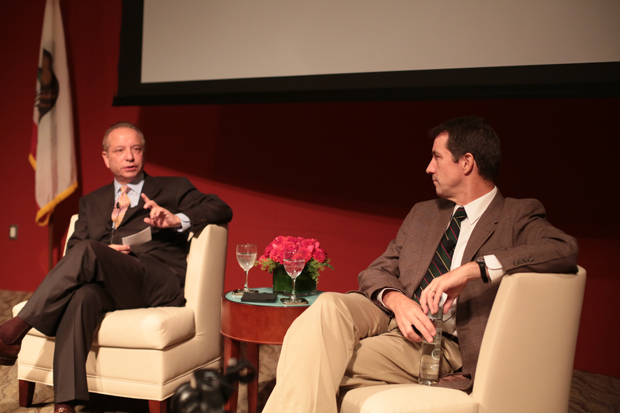Translating scientific discovery to practical benefit is a difficult challenge, and Christopher Austin, MD, director of the National Center for Advancing Translational Sciences (NCATS), thinks sickle cell disease is a prime example.
Although the molecular and genetic defect that causes sickle cell disease was discovered in 1949, six decades have passed and yet no treatment for the disease exists. This gap between knowing what makes people sick and finding effective treatments was a primary focus of Austin’s July 9 presentation in Aresty Auditorium as part of the Dean’s Distinguished Lecturer Series.
“Translational science is poorly done,” said Austin in describing how translational science seeks to take research discoveries and develop and test them for clinical uses. “It is costly, time-consuming and inefficient.”
The process of translational science faces hurdles at every stage, said Austin, which is why the National Institutes of Health established NCATS in 2002. During his speech, Austin shared some of the ways that NCATS attempts to make translational science quicker, more effective and less costly:
- One initiative developed a network of more than 60 academic medical institutions that includes the Southern California Clinical and Translational Science Institute at USC. By pooling resources, so-called NCATS hubs can improve clinical trials by creating a patient recruitment database and centralizing the painstaking reviews and contract negotiations that can delay efforts for years.
- NCATS pairs academic researchers with pharmaceutical companies to benefit both. NCATS helped London-based AstraZeneca find academic researchers in the United States when one of its cancer drugs wasn’t testing well, for example. The drug has since been resurrected as a possible treatment for Alzheimer’s disease.
- NCATS creates resources such as a chemistry genomics center to help scientists get past the barriers of developing assays and chemical library screening methods. It is also establishing new and novel ways to help scientists more quickly predict toxicity.
Austin reminded the audience of faculty and students from the Keck School of Medicine of USC why translational science is worth it despite the hurdles. Scientists have identified the molecular defects responsible for nearly 5,500 diseases, he noted, but an FDA-approved therapy exists for just 500 of them.
“This is an unbelievable time to be in translational science because you have a real opportunity to help people,” Austin said.
— Hope Hamashige



